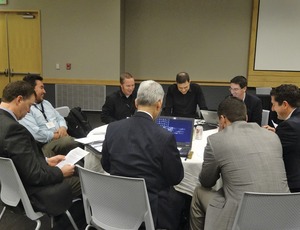
Big data, automation and the "internet of things" will profoundly influence the construction and management of transportation infrastructure—and industry insiders are still trying to figure out exactly how that will happen.
This mind-set was reflected at the most popular sessions at the Transportation Research Board's annual meeting, the theme of which was "Corridors to the Future: Transportation and Technology." Held on Jan. 11-15 in Washington, D.C., the meeting primarily focused on connected and autonomous vehicles, with TRB attendees eager to learn their looming effect on states' infrastructure planning, operation and maintenance. Data derived from automated, hybrid and plug-in electric vehicles and other advanced vehicle systems likely will help to develop more individualized fuel-economy information, which, in turn, will foster more accurate comparisons with their conventional internal-combustion counterparts.
The transformational effects of these technologies impressed a panel of state DOT executives, who discussed what agencies need to do to prepare. Managing road and bridge inventories will no longer be enough. "We're travel agents," said Carlos Braceras, executive director of the Utah Dept. of Transportation. "We need to figure out how to get people where they need to be."
Likewise, agencies will seek new approaches to solve new challenges, which will require a different set of skills. To fully take advantage of these technologies, "we'll need civil engineers who have a systems understanding," predicted John Barton, deputy executive director of the Texas Dept. of Transportation.
The biggest challenge may well be the proliferation of even more disruptive technologies, resulting in a less certain evolution of transportation than what has been experienced for the past half- century. As John Halikowski, director of the Arizona Dept. of Transportation, noted, "The possibilities are pretty wide open for things we haven't thought of."
Industry is trying to think of them. "We are at a crossroads with reprogramming mobility," said Ted Zoli, national chief bridge engineer with HNTB and a workshop leader at the American Road & Transportation Builders Association's TransOvation meeting last November at Microsoft's headquarters in Redmond, Wash. "We are seeing a digital transformation of transportation."
Participants discussed the potential impacts of mobile devices, the "internet of things" and automated vehicles on roads. Noting that the latter was predicted as early as 1956, Diana Mendez, an AECOM senior vice president, said, "How do we build flexible infrastructure to accommodate future change?"
Kirk Steudle, director of the Michigan Dept. of Transportation, described the agency's use of big data—regarding weather, roads, snowplow records and so on—to optimize maintenance decisions and traveler information. The agency also is testing a "smart" corridor for connected vehicles of all types. "How will data streams change how people move and how DOTs make decisions?" he asked.

Post a comment to this article
Report Abusive Comment